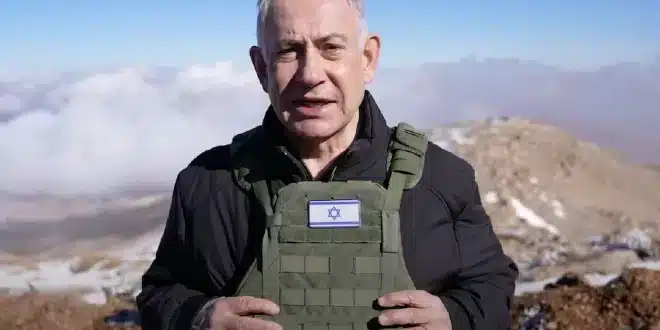Prime Minister Benjamin Netanyahu stated that Israeli forces will maintain their position in a buffer zone along the Syrian border, which was seized following the removal of President Bashar al-Assad, until a new arrangement is established to secure Israel’s safety.
Netanyahu made the statement on Tuesday while visiting Mount Hermon, located inside Syria near the Israeli-controlled Golan Heights. This marked the first time an Israeli leader had visited this area. Netanyahu recalled visiting the mountaintop as a soldier 53 years ago, noting that the location’s strategic importance for Israel had grown in light of recent developments.
Israel captured the buffer zone, a demilitarized area of roughly 400 square kilometers, just days after Assad was ousted by rebels. This move has drawn criticism, with accusations that Israel is exploiting the instability in Syria to annex land and violate a 1974 ceasefire agreement.
Netanyahu emphasized that Israeli forces would stay in the area until a new arrangement that ensures security is reached. Defense Minister Israel Katz, who accompanied Netanyahu, ordered the military to establish fortifications, preparing for a potentially prolonged presence. Katz described the summit as Israel’s “eyes” for identifying threats in the region.
The U.N. had established the buffer zone after the 1973 Middle East war, and a peacekeeping force had patrolled the area. A U.N. spokesperson condemned Israel’s actions, asserting that the presence of Israeli troops in the zone violated the agreement and amounted to occupation.
While no immediate response from the opposition group Hayat Tahrir al-Sham (HTS) or other Arab states was reported, the situation has further complicated Israel’s relations in the region.
Meanwhile, as Syria navigates its post-Assad era, a U.N. official indicated that militant leaders are committed to expanding humanitarian aid efforts. Syrian authorities, led by the HTS, pledged to support aid delivery from neighboring countries. Germany and the U.S. have also engaged with these insurgent leaders, discussing Syria’s political transition and human rights protections.
In other news, the U.S.-backed Syrian Democratic Forces proposed establishing a demilitarized zone in the Kurdish-majority town of Kobani in northern Syria. This proposal comes amid tensions with Turkey, which views Kurdish forces as terrorist groups.
Furthermore, mass graves containing the bodies of over 30 Syrians, victims of Assad’s regime, were uncovered in the village of Izraa, intensifying the ongoing humanitarian crisis. Families of the missing had hoped to find their loved ones alive, but instead discovered victims who had been tortured and killed under the regime.
On the diplomatic front, Qatar reopened its embassy in Damascus, a significant move after severing ties with Assad’s government 13 years ago. Other embassies, including those of France and Turkey, have also resumed diplomatic relations with Syria, signaling shifts in international stance following Assad’s removal.


